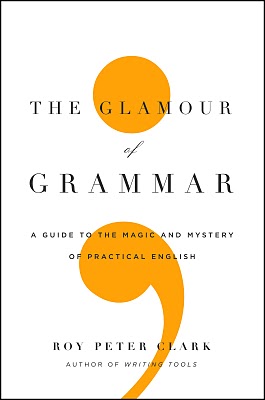Recommended: The Glamour of Grammar
 I came across The Glamour of Grammar by Roy Peter Clark while looking for an approachable guide to grammar for my graduate students. Grammar is something that everyone struggles with, regardless of whether you're a native speaker of English or not. Many things you've learned as a student may or may not have changed over time. Any student of language would also realize that grammatical rules evolve, so rules such as "never end your sentence with a preposition" are one of those rules that are falling out of use. (I also read this right after Albert C. Baugh and Thomas Cable's brilliant A History of the English Language, which went in depth into many other issues, and focused a lot more on the historical evolution of language since its beginnings, and its foreign influences over time.)
I came across The Glamour of Grammar by Roy Peter Clark while looking for an approachable guide to grammar for my graduate students. Grammar is something that everyone struggles with, regardless of whether you're a native speaker of English or not. Many things you've learned as a student may or may not have changed over time. Any student of language would also realize that grammatical rules evolve, so rules such as "never end your sentence with a preposition" are one of those rules that are falling out of use. (I also read this right after Albert C. Baugh and Thomas Cable's brilliant A History of the English Language, which went in depth into many other issues, and focused a lot more on the historical evolution of language since its beginnings, and its foreign influences over time.)
The title of the book derives from the notion that "glamour" and "grammar" had once been the same word. "Grammar" had to do with learning and "glamour" had to do with enchantment (as in spells). They diverged in their meaning over time, and Clark attempts to bring back their original meanings by suggesting that there is something quite powerful in using language correctly, even if it means fussing over some of the finer details.
The book is organized into five parts, going from the word-level to the semantic (meaning) level, all the while covering topics such as punctuation, common spelling mistakes, sentence structure, and etymology. Each chapter is short and readable and written with great wit. The chapters also end with a "Keepsakes" section that summaries the key points to each chapter. They also serve as ways in which you can check on whether you're using the right word, punctuation, sentence structure, and so on in your writing choices.
What's great with this book in particular is that it covered punctuation, which is a topic that many grammar books tend to skip. The textbook I use The Grammar Book by Marianne Celce-Murcia and Diane Larsen-Freeman, perhaps because it's not regarded as a central grammar topic per se, especially since punctuation wasn't invented till much later. But having done some scholarly writing myself, I appreciated having a consistent source for finding out minor (but important) rules about where to place certain punctuation marks, and their intended effects in the sentence. Commas remain a persistent issue; I tend to place them at points where others want to take it out, and it looks like I was often right in my choices.
It was also nice to know the names of certain things, such as "left-branching sentences" (which has to do with the number of words you put between your subject and verb). One problem with writing is that people have the tendency to feel that the more complex and difficult to understand your writing is, the smarter you come across or the better your writing would appear. Clark does not agree with this (nor do I) and he suggests how you can ease the load on your reader while also making your point clear. That is to say, you can write in ways that are easy to understand and still be sophisticated in your content is sophisticated. If you have to confound your audience by writing poorly structured sentences, then you're not being a good writer.
I appreciate that Clark drew from a variety of sources for his examples, including plays, reports, novels, history books, TV shows, newspapers, journals, and so on. This really expands the applicability of his suggestions, making it useful on many levels, for many audiences.
It's a great book for beginner and experts alike, and perfect for a class on language, grammar and communication.